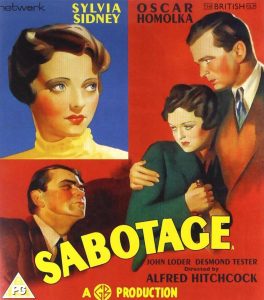By Armando Inquig
 Although ‘Sabotage’ is one of Alfred Hitchcock’s lesser-known films, its darker elements mark it as a significant precursor to his later works.
Although ‘Sabotage’ is one of Alfred Hitchcock’s lesser-known films, its darker elements mark it as a significant precursor to his later works.
Released in 1936, Sabotage is one of Hitchcock’s British productions before he moved to the US and transitioned into Hollywood. The film is narratively daring for its time, incorporating dark and tragic elements that Hitchcock would later become known for.
The film follows cinema owner Karl Verloc (played by Oscar Homolka), a man who engages in attacks against the city’s infrastructure. His wife, Mrs. Verloc (Sylvia Sidney), and her younger brother, Stevie (Desmond Tester), are unaware of his activities.
Detective sergeant Ted Spencer (John Loder) is assigned to investigate Verloc and infiltrate his life under the guise of a cinema patron. As Spencer delves deeper into his investigation, Mrs. Verloc gradually senses that something is wrong with her husband. It is soon revealed that Verloc, pressured by his co-conspirators, is planning to carry out a big sabotage act.
Verloc secretly instructs Stevie to deliver a film canister containing a lethal bomb, set to explode in the heart of London. Stevie is unaware of its contents and innocently agrees to transport the canister. But the bomb tragically detonates on a crowded bus, killing the young boy and sending shockwaves through the city. Mrs. Verloc is devastated by the loss of her brother and, in a moment of anger, she confronts Karl and ends up stabbing and killing him.
By now, Detective Spencer who seemingly developed feelings for Mrs. Verloc, is torn and conflicted. Will Detective Spencer abide by his obligations and turn Mrs. Verloc in, or will his emotions prevail and help her escape?
In true Hitchcockian fashion, the film navigates moral dilemmas about loyalty, guilt and justice, themes that became a hallmark of his storytelling style and continued throughout the rest of his career. His direction is steady, focused on the psychological complexities of the characters without devolving into conventional tropes.
“Sabotage” is released as “The Woman Alone” in the United States, and is now available in Blu-ray in the United Kingdom in a high-definition format.
